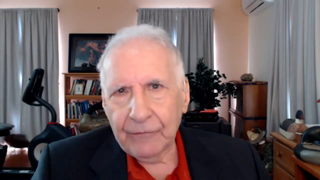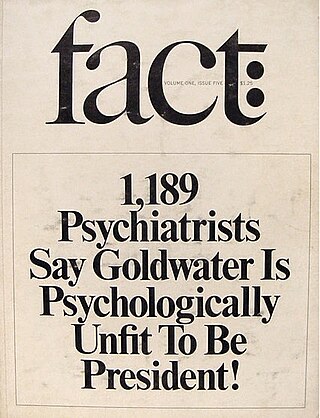Related Research Articles
Anti-psychiatry, sometimes spelled antipsychiatry, is a movement based on the view that psychiatric treatment can be often more damaging than helpful to patients. The term anti-psychiatry was coined in 1912, and the movement emerged in the 1960s, highlighting controversies about psychiatry. Objections include the reliability of psychiatric diagnosis, the questionable effectiveness and harm associated with psychiatric medications, the failure of psychiatry to demonstrate any disease treatment mechanism for psychiatric medication effects, and legal concerns about equal human rights and civil freedom being nullified by the presence of diagnosis. Historical critiques of psychiatry came to light after focus on the extreme harms associated with electroconvulsive therapy and insulin shock therapy. The term "anti-psychiatry" is in dispute and often used to dismiss all critics of psychiatry, many of whom agree that a specialized role of helper for people in emotional distress may at times be appropriate, and allow for individual choice around treatment decisions.

Thomas Stephen Szasz was a Hungarian-American academic and psychiatrist. He served for most of his career as professor of psychiatry at the State University of New York Upstate Medical University. A distinguished lifetime fellow of the American Psychiatric Association and a life member of the American Psychoanalytic Association, he was best known as a social critic of the moral and scientific foundations of psychiatry, as what he saw as the social control aims of medicine in modern society, as well as scientism.
The American Psychiatric Association (APA) is the main professional organization of psychiatrists and trainee psychiatrists in the United States, and the largest psychiatric organization in the world. It has more than 38,000 members who are involved in psychiatric practice, research, and academia representing a diverse population of patients in more than 100 countries. The association publishes various journals and pamphlets, as well as the Diagnostic and Statistical Manual of Mental Disorders (DSM). The DSM codifies psychiatric conditions and is used mostly in the United States as a guide for diagnosing mental disorders.

There was systematic political abuse of psychiatry in the Soviet Union, based on the interpretation of political opposition or dissent as a psychiatric problem. It was called "psychopathological mechanisms" of dissent.

Forensic psychiatry is a subspeciality of psychiatry and is related to criminology. It encompasses the interface between law and psychiatry. According to the American Academy of Psychiatry and the Law, it is defined as "a subspecialty of psychiatry in which scientific and clinical expertise is applied in legal contexts involving civil, criminal, correctional, regulatory, or legislative matters, and in specialized clinical consultations in areas such as risk assessment or employment." A forensic psychiatrist provides services – such as determination of competency to stand trial – to a court of law to facilitate the adjudicative process and provide treatment, such as medications and psychotherapy, to criminals.

Moses Sheppard (1771-1857) was a Baltimore businessman, a Friend (Quaker), a philanthropist, and founder of the now-Sheppard and Enoch Pratt Hospital.

Peter Roger Breggin is an American psychiatrist and critic of shock treatment and psychiatric medication and COVID-19 response. In his books, he advocates replacing psychiatry's use of drugs and electroconvulsive therapy with psychotherapy, education, empathy, love, and broader human services.
The biopsychiatry controversy is a dispute over which viewpoint should predominate and form a basis of psychiatric theory and practice. The debate is a criticism of a claimed strict biological view of psychiatric thinking. Its critics include disparate groups such as the antipsychiatry movement and some academics.
The Chinese Society of Psychiatry is the largest organization for psychiatrists in China. It publishes the Chinese Classification of Mental Disorders ("CCMD"), first published in 1985. The CSP also publishes clinical practice guidelines; promotes psychiatric practice, research and communication; trains new professionals; and holds academic conferences.
Child and adolescent psychiatry is a branch of psychiatry that focuses on the diagnosis, treatment, and prevention of mental disorders in children, adolescents, and their families. It investigates the biopsychosocial factors that influence the development and course of psychiatric disorders and treatment responses to various interventions. Child and adolescent psychiatrists primarily use psychotherapy and/or medication to treat mental disorders in the pediatric population.
Paul Stuart Appelbaum is an American psychiatrist and a leading expert on legal and ethical issues in medicine and psychiatry.

The Citizens Commission on Human Rights International (CCHR) is an anti-psychiatry lobbying organization established in 1969 by the Church of Scientology and psychiatrist Thomas Szasz. Headquartered in Los Angeles, California, its stated mission is to "eradicate abuses committed under the guise of mental health and enact patient and consumer protections." It is regarded by most non-Scientologists as a Scientology front group whose purpose is to push the organization's anti-psychiatry agenda.

Joshua M. Sharfstein is a physician and the current Vice Dean for Public Health Practice and Community Engagement at the Johns Hopkins Bloomberg School of Public Health. He was Secretary of the Maryland Department of Health from 2011 to 2014, and was principal deputy commissioner of the U.S. Food and Drug Administration until he stepped down from his post on January 5, 2011. He is the former health commissioner of Baltimore, Maryland.

Jeffrey Alan Lieberman is an American psychiatrist who specializes in schizophrenia and related psychoses and their associated neuroscience (biology) and pharmacological treatment. He was principal investigator for CATIE, the largest and longest independent study ever funded by the United States National Institute of Mental Health to examine existing pharmacotherapies for schizophrenia. He was president of the American Psychiatric Association from May 2013 to May 2014.

The Independent Psychiatric Association of Russia (IPA) is the sole Russian non-governmental professional organization that makes non-forensic psychiatric expert examination at the request of citizens whose rights have been violated with the use of psychiatry. The IPA is not a state institution but a public organization, and its medical reports have not a legal but an ethical significance. There is nowhere to refute one's misdiagnosis in Russia. In recent years, the IPA forces restrictions on patients' rights and transinstitutionalization of those with mental illness.

The Goldwater rule is Section 7 in the American Psychiatric Association's (APA) Principles of Medical Ethics, which states that psychiatrists have a responsibility to participate in activities contributing to the improvement of the community and the betterment of public health, but when asked to comment on public figures, they shall refrain from diagnosing, which requires a personal examination and consent. It is named after former U.S. Senator and 1964 Republican presidential nominee Barry Goldwater.

Political abuse of psychiatry implies a misuse of psychiatric diagnosis, detention and treatment for the purposes of obstructing the fundamental human rights of certain groups and individuals in a society. In other words, abuse of psychiatry including one for political purposes is the deliberate action of getting citizens certified, who, because of their mental condition, need neither psychiatric restraint nor psychiatric treatment. Psychiatrists have been involved in human rights abuses in states across the world when the definitions of mental disease were expanded to include political disobedience. As scholars have long argued, governmental and medical institutions code menaces to authority as mental diseases during political disturbances. Nowadays, in many countries, political prisoners are sometimes confined and abused in mental institutions. Psychiatric confinement of sane people is uniformly considered a particularly pernicious form of repression.
Norman Sartorius is a German-Croatian psychiatrist and university professor. Sartorius is a former director of the World Health Organization's (WHO) Division of Mental Health, and a former president of the World Psychiatric Association and of the European Psychiatric Association. He has been described as "one of the most prominent and influential psychiatrists of his generation" and as a "living legend".

Edward Nathaniel Brush was an American physician, a mental hospital administrator, and an editor of psychiatric journals.

Sheppard Pratt at Ellicott City was a private psychiatric hospital located in Ellicott City, Maryland. It had a 20-bed adult unit, an 18-bed co-occurring disorders unit, an 18-bed crisis stabilization unit, a 22-bed adolescent unit, and an adult day hospital. The hospital was owned and operated by the Towson, Maryland based Sheppard Pratt Health System
References
- ↑ Roth, Sheldon (2006). Steven S. Sharfstein, M.D., M.P.A., 132nd President, 2005–2006. Am J Psychiatry 163:1719, October 2006 doi : 10.1176/appi.ajp.163.10.1719
- ↑ Lewis, Neil A. (November 13, 2005). Guantánamo Tour Focuses on Medical Ethics. New York Times
- ↑ Sharfstein, Steven S. (August 19, 2005). "Big Pharma and American Psychiatry: The Good, the Bad, and the Ugly". Psychiatric News. 40 (16). American Psychiatric Association: 3. Archived from the original on June 21, 2006. Retrieved October 22, 2010.
- ↑ Carey, Benedict and Gardiner Harris (July 12, 2008). Psychiatric Group Faces Scrutiny Over Drug Industry Ties. New York Times
- ↑ Gantz, Sarah (8 January 2015). "Longtime Sheppard Pratt CEO Dr. Steven Sharfstein to step down in July 2016". Baltimore Business Journal. Retrieved 27 April 2015.
- ↑ "Principal Deputy Commissioner". www.fda.gov. Archived from the original on 2009-06-06.